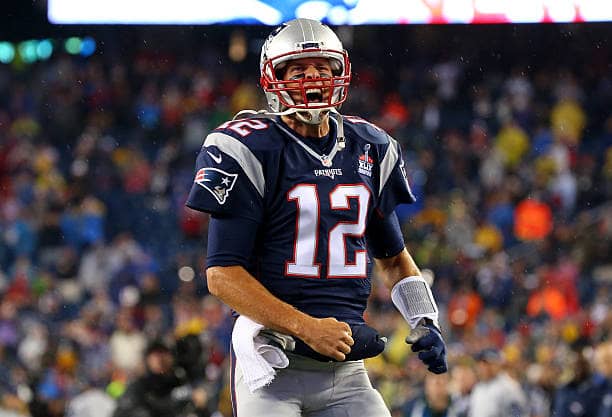Table of Contents
Had it not been for David Tyree’s helmet catch, a relentless New York Giants pass rush, and an uneven Super Bowl XLII performance by Tom Brady, most football fans would consider the 2007 New England Patriots to be the National Football League’s all-time greatest team.
Instead, the only team to roll through the regular season with a 16-0 record is relegated to a weird place in history: respected for how close it came to winning every game, resented because of that season’s “Spygate scandal,” discussed all these years later due to its lasting influence, and weirdly blended along with the other Patriots teams that didn’t win in the year the Patriots were enjoying a nearly two-decade dynasty run.
But without a win in their final game and the hardware to show for it, the ‘07 Pats aren’t viewed by most as the NFL’s greatest-ever team.
Instead, when the NFL commemorated its 100th year in 2019 by listing its top 100 all-time teams, Super Bowl 42’s runner-up was ranked seventh-best, behind six Lombardi Trophy-winning teams, but ahead of any team that’s taken the field since 1993.
The ‘07 Patriots are actually the only 21st-Century team ranked among the top 15 teams of all time, and one of only three since 1999 included in the top 20, with the 2004 Patriots ranked 16th and the 2013 Seattle Seahawks 18th.
The top of the rankings has a decidedly old-school lean. Only the 2007 Patriots and the sixth-ranked Super Bowl champion 1992 Dallas Cowboys are post-1989 squads listed among the NFL’s ten best. Four of the top 10 are teams from the 1970s, three are from the 1980s, and one is from the 1960s, with the 1962 NFL Champion Green Bay Packers ranked ninth.
Shrinking Margin Between NFL’s Best & Worst
So why are teams from the 1970s and 1980s considered the best ever, and why has it been so hard for teams from the last 30 years to be considered among the elite of the elite?
The NFL’s continued drive toward parity over the past three decades provides part of the explanation. The league prides itself on there being no inherent advantages to any franchise based on factors like market size or the overall wealth of its owner. Television, streaming, licensing and merchandising money is distributed evenly.
The year 1993 introduced true free agency, theoretically giving every team a chance to acquire established stars. A salary cap was implemented before the 1994 season, and a rookie wage scale with standardized contract length for draft picks came to be in 2011.
Neither of these things can protect a team from its own mismanagement or bad luck, and well-run organizations—especially those with very good quarterbacks—will always have a chance for sustained success. However, the league’s aim is for little difference every season between the absolute best teams and its bottom-feeders.
As a result, the league’s teams have been bunched much closer together than in the first 25 or so years after the NFL’s merger with the American Football League. This is reflected in part by the decrease in games with a margin of more than seven points.
During the 1972 season, when the Dolphins finished with an undefeated record and won the Super Bowl, 61% of NFL regular season games were decided by seven points or more. In the first salary-capped season of 1994, less than half of the league’s regular season games were decided by more than seven points.
This trend has continued in more recent seasons. The 2016 campaign featured an all-time high in the number of games decided by seven points or fewer, at 52.7%. It was nearly eclipsed in 2022, when 52% of regular season games had a margin of seven points or fewer.
Winning Teams Lose More Often Than Before
With more games decided by closer margins, the teams with the best records are less likely to roll through their schedule with a bunch of blowouts. They’re also more likely to lose games.
The 1972 Dolphins and 1985 Chicago Bears not only had a sole loss between them (ironically, it was suffered by Chicago against Miami), they combined for only five victories of less than seven points.
The most recent team listed among the NFL’s top 100 is the 2013 Seattle Seahawks, who had as many wins by seven points or fewer than the ‘72 Dolphins and ‘85 Bears combined, including two that came in overtime.
They also lost three games, the same combined total as the 1972 Dolphins, 1985 Bears, and 1978 Pittsburgh Steelers.
The team with the best regular season record of the past decade is the 2015 Carolina Panthers, whose 15-1 record included six wins by seven points or less and whose playoff run didn’t end with a Super Bowl victory.
Playoff Expansion & The NFL’s Eight-Division Structure
Playoff expansion has made it less likely that the best regular season teams end the postseason as the last one standing, and the chance of a team winning a title despite having a good-but-not-great record has increased.
When the NFL and AFL finished its merger in 1970, the playoffs were set up to include eight teams. The field increased to ten in 1978, then 12 in 1990, and after more postseason expansion in 2020, there are now 14 teams that qualify for the postseason, with further expansion to 16 – half the league – seeming likely, and some would argue, inevitable.
The league also expanded each conference from three divisions to four in 2002, to accommodate the expansion Houston Texans. This not only increased the likelihood of the weaker division champions qualifying for the postseason, but it often strengthened the wild card field. Prior to this change, there were three wild card teams that won the Super Bowl. Since, there have been four.
We’ve also had a 21st-Century explosion in teams winning the Super Bowl without a dominant record. Over the first 35 years of the Super Bowl era, just two teams won championships despite losing five games or more, and one of those was the 1988 49ers, who repeated the following season after going 15-1.
Since the 2001 season, nine teams have won titles after losing five or more regular season games, including last year’s six-loss Kansas City team, and the seven-loss Giants team that upset the undefeated Patriots almost 17 years ago.
So as the NFL has evolved, continually implementing ways to sustain and foster parity while adding regular season games and expanding the playoffs, it is less likely for a winning team to dominate its competition with the gap between the best and worst teams being closer than ever.
It is less likely for a team to finish the regular season with a tiny number of defeats.
It is more difficult than ever for a team that does get through the regular season with the league’s best record to parlay that success into a Super Bowl title.
If a team is going to be considered one of the absolute all-time greats and be included in any conversation of the NFL’s most iconic single-season teams, an exemplary record is required, weekly dominance over its opponents is preferred, and as the placement of the 2007 Patriots on the Top 100 list proves, a Lombardi Trophy is mandatory.
Each of those things is hard to achieve. Combining them has never been more difficult.
Photo by Jim Rogash/Getty Images


